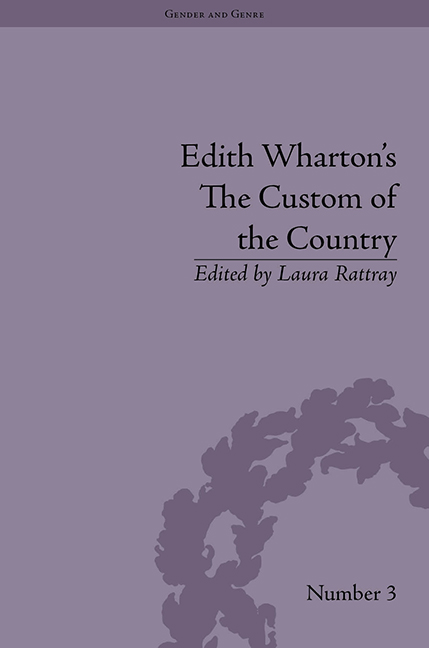Book contents
- Frontmatter
- CONTENTS
- Acknowledgements
- Editorial Note
- List of Contributors
- List of Figures
- Introduction
- 1 The Custom of the Country: Edith Wharton's Conversation with the Atlantic Monthly
- 2 When the Reading Had to Stop: Readers, Reading and the Circulation of Texts in The Custom of the Country
- 3 ‘Don't Cry – it ain't that Kind of a Story’: Wharton's Business of Fiction, 1908–12
- 4 Worst Parents Ever: Cultures of Childhood in The Custom of the Country
- 5 Crude Ascending the Staircase: Undine Spragg and the Armory Show
- 6 ‘It's Better to Watch’: Compulsive Voyeurism in The Custom of the Country and The House of Mirth
- 7 A ‘Mist of Opopanax’: Mapping the Scentscape of The Custom of the Country
- 8 Landscape with the Fall of Undine
- 9 Girls from the Provinces: Wharton's Undine Spragg and Cather's Thea Kronborg
- 10 Men at Work in The Custom of the Country
- 11 ‘Lost in Translation’: Financial Plots and the Modernist Reader in The Custom of the Country
- Notes
- Index
6 - ‘It's Better to Watch’: Compulsive Voyeurism in The Custom of the Country and The House of Mirth
- Frontmatter
- CONTENTS
- Acknowledgements
- Editorial Note
- List of Contributors
- List of Figures
- Introduction
- 1 The Custom of the Country: Edith Wharton's Conversation with the Atlantic Monthly
- 2 When the Reading Had to Stop: Readers, Reading and the Circulation of Texts in The Custom of the Country
- 3 ‘Don't Cry – it ain't that Kind of a Story’: Wharton's Business of Fiction, 1908–12
- 4 Worst Parents Ever: Cultures of Childhood in The Custom of the Country
- 5 Crude Ascending the Staircase: Undine Spragg and the Armory Show
- 6 ‘It's Better to Watch’: Compulsive Voyeurism in The Custom of the Country and The House of Mirth
- 7 A ‘Mist of Opopanax’: Mapping the Scentscape of The Custom of the Country
- 8 Landscape with the Fall of Undine
- 9 Girls from the Provinces: Wharton's Undine Spragg and Cather's Thea Kronborg
- 10 Men at Work in The Custom of the Country
- 11 ‘Lost in Translation’: Financial Plots and the Modernist Reader in The Custom of the Country
- Notes
- Index
Summary
No Edith Wharton heroine has captured readers’ sympathy quite like the very tragic Lily Bart of The House of Mirth (1905). Though remarkably beautiful, she is ultimately unable to secure a marriage that will grant her financial stability and security. Wharton's novel traces the young woman's descent from a privileged pedestal in society's upper echelon to her lonely death by overdose in a boarding house. Critics and Wharton scholars, both when the novel was published and today, are often inclined to discuss the novel's staggering popularity and posit arguments as to why readers were so taken with what is arguably one of the most tragic tales Wharton ever told. Conversely, no Edith Wharton heroine has elicited readers’ antipathy quite like the very selfish Undine Spragg of The Custom of the Country (1913). While she too is remarkably beautiful, Undine Spragg is ultimately unable to secure a marriage that will completely fulfil her seemingly endless desire for increased wealth and upward social mobility. Never satisfied with her current position, Undine's climb through society's ranks is both swift and ruthless. While readers may follow Lily's decline with trepidation, they observe Undine's ascent with dismay and repulsion. In both cases, however, we are constantly compelled to keep watching.
Lily Bart and Undine Spragg are, in many ways, opposite sides of the same lovely coin. While the former ‘might be incapable of marrying for money’, the latter has no qualms about trading marital vows for fortunes or family titles.
- Type
- Chapter
- Information
- Edith Wharton's The Custom of the CountryA Reassessment, pp. 87 - 100Publisher: Pickering & ChattoFirst published in: 2014



